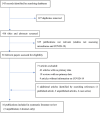The human microbiome and COVID-19: A systematic review
- PMID: 34161373
- PMCID: PMC8221462
- DOI: 10.1371/journal.pone.0253293
The human microbiome and COVID-19: A systematic review
Abstract
Background: Human microbiotas are communities of microorganisms living in symbiosis with humans. They play an important role in the host immune response to respiratory viral infection. However, evidence on the human microbiome and coronavirus disease (COVID-19) relationship is insufficient. The aim of this systematic literature review was to evaluate existing evidence on the association between the microbiome and COVID-19 in humans and summarize these data in the pandemic era.
Methods: We conducted a systematic literature review on the association between the microbiome and COVID-19 in humans by searching PubMed, Embase, and the Cochrane Library, CINAHL, and Web of Science databases for articles in English published up to October 31, 2020. The results were analyzed qualitatively. This study is registered with PROSPERO (CRD42020195982).
Results: Of the 543 articles identified by searching databases, 16 in line with the research objectives were eligible for qualitative review: eight sampled the microbiome using stool, four using nasopharyngeal or throat swab, three using bronchoalveolar lavage fluid, and one using lung tissue. Fecal microbiome dysbiosis and increased opportunistic pathogens were reported in COVID-19 patients. Several studies suggested the dysbiosis in the lung microbiome of COVID-19 patients with an abundance of opportunistic pathogens using lower respiratory tract samples. The association between COVID-19 severity and the human microbiome remains uncertain.
Conclusion: The human fecal and respiratory tract microbiome changed in COVID-19 patients with opportunistic pathogen abundance. Further research to elucidate the effect of alternation of the human microbiome in disease pathogenesis is warranted.
Conflict of interest statement
The authors declare no competing interest.
References
Publication types
MeSH terms
LinkOut - more resources
Full Text Sources
Medical


